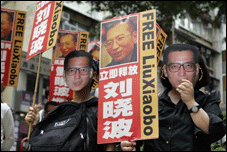OSLO: A record 237 candidates are in the running for this year's Nobel Peace Prize, the Nobel Institute said, with Chinese dissidents and the founders of the Internet known to be on the list.
"The final number of candidates is 237, including 38 organisations," Geir Lundestad, the head of the Nobel Institute, said.
That, he said "is the highest number we've ever had," exceeding the previous record of 205 candidates for last year's prize, which to widespread surprise went to US President Barack Obama.
The names of nominees are kept secret by the institute for 50 years. But those who are entitled to nominate are allowed to reveal the name of the person or organisation they have proposed, if they wish to do so.
A number of Chinese dissidents are thus known to figure on this year's list, including Liu Xiaobo, who was recently sentenced to 11 years in prison for co-authoring a manifesto calling for political reform in China.
Other dissidents on the list, including Hu Jia, Gao Shisheng, Chen Guangcheng, Bao Tong and Rebiya Kadeer, the exiled leader of the Chinese Uighur minority.
A win by any critic of the Chinese regime would certainly provoke rapid condemnation from Beijing, which reacts vehemently each time a Chinese dissident is mentioned as a candidate and which in the past has warned the Norwegian Nobel Committee not to interfere in China's internal affairs.
Russian human rights group Memorial and its founding member Svetlana Gannushkina have also been nominated for the prestigious prize, as has the International Space Station.
Other nominees include three people widely regarded as the creators of the Internet: Americans Larry Roberts and Vint Cerf and Britain's Tim Berners-Lee, whose inventions gave rise to sites like Twitter that helped unite opposition demonstrators in Iran.
Israeli nuclear whistleblower Mordechai Vanunu, who has long figured among the candidates, is also in the running for the 2010 prize despite his appeal to be removed from the list.
"Attention surrounding the Nobel Peace Prize keeps growing and awarding the prize to Barack Obama last year may have increased interest," Lundestad said, explaining the record number of candidates this year.
Figuring on the growing list in no way means a person or organisation has the blessing of the five-member Nobel Committee that awards the prize however, according to the Nobel Institute.
Thousands of people are eligible to submit nominations, including members of parliament and government worldwide, university professors, previous laureates and members of several international institutes.
The Nobel Committee that awards the prize is also eligible to nominate candidates.
After the Obama "bombshell" last year, observers are expecting a more conventional prize winner this year, said head of the International Peace Research Institute in Oslo (PRIO) Krisian Berg Harpviken.
"The 2010 peace prize is most likely to be awarded to a candidate who has made a significant contribution to the prevention, amelioration or resolution of armed conflict, in line with the spirit of Alfred Nobel's will," he wrote on the Prio website.
"Unlike 2009, however, the recipient of this year's prize is probably not going to be somebody who is a household name around the globe," he added.
His picks included the Special Court for Sierra Leone, woman doctor and head of the Afghan Independent Human Rights Commission Sima Samar, and American Gene Sharp, the founder of a non-profit group devoted to studying and promoting the use of nonviolent action.
The name of the winner will be announced in early October, and the award will be presented at a formal ceremony held -- as tradition dictates -- on December 10.



